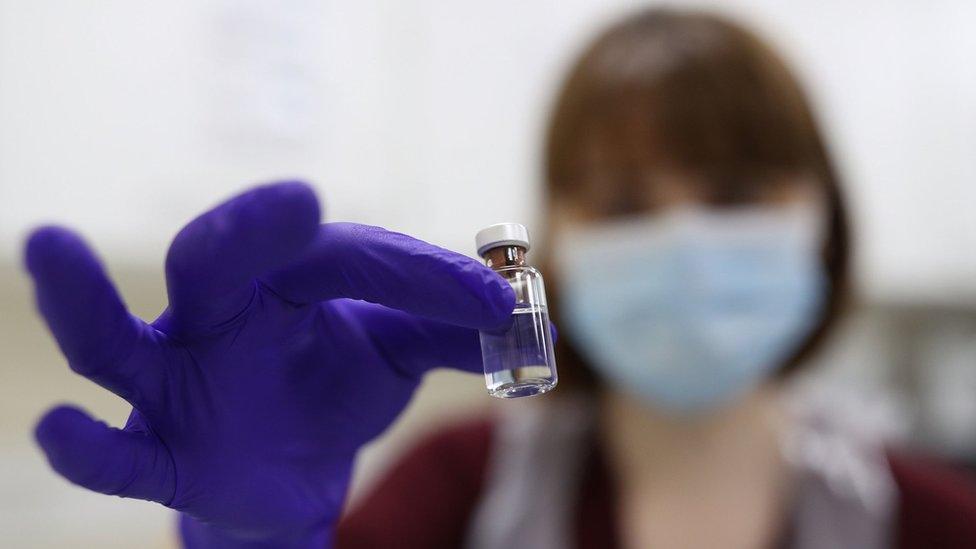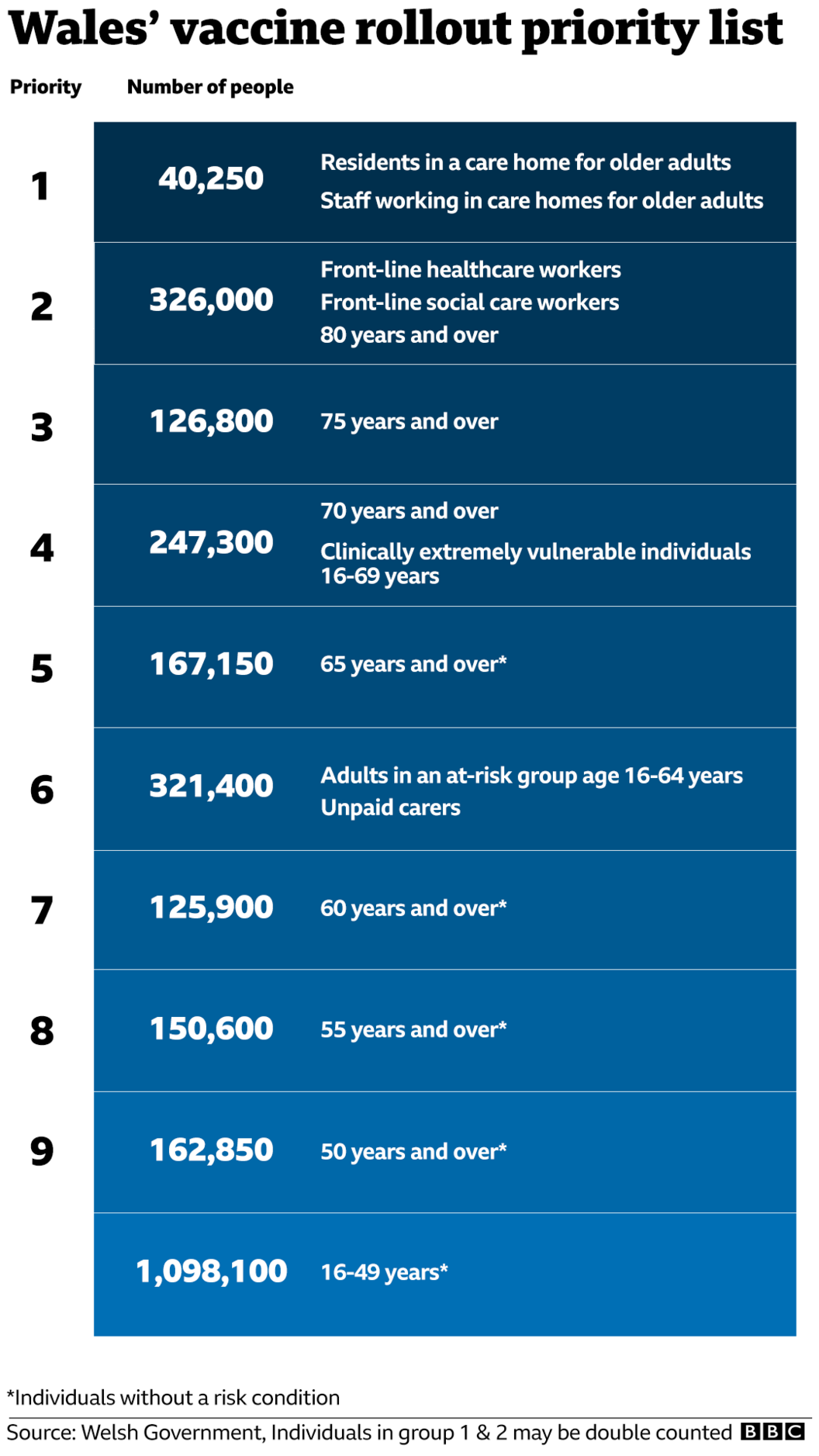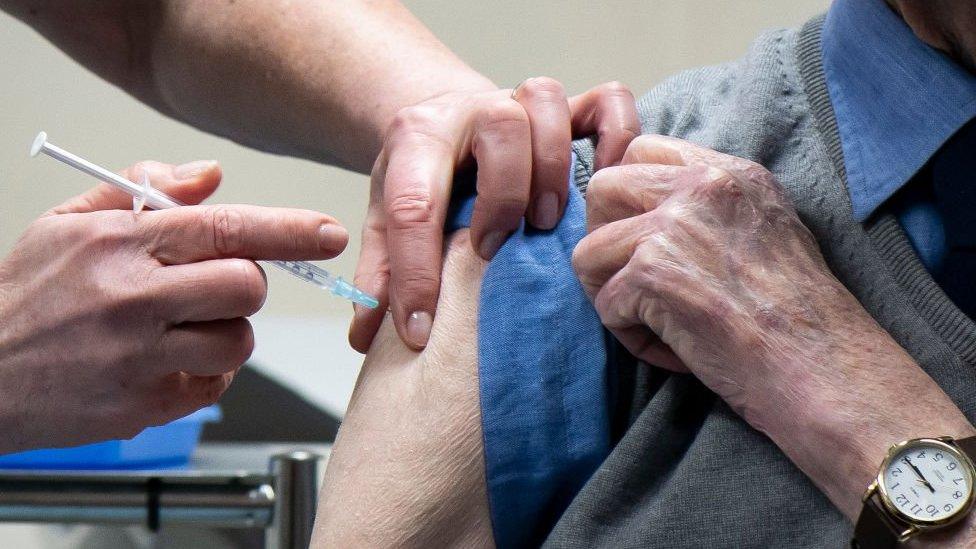Covid vaccine in Wales: Common questions answered
- Published

The Pfizer vaccine was the first to be approved in the UK
Will I need to avoid getting pregnant after having the coronavirus vaccine?
And can I drink alcohol before or after the jab?
We answer some of the common vaccine questions.
How do the Pfizer and Oxford vaccines work?
Three vaccines have been approved for use in the UK so far - Pfizer-BioNTech, Oxford-AstraZeneca and Moderna.
Pfizer, which was the first to be authorised and used here, works in a similar way to Moderna, the first batches of which are expected in the spring.
They are both called RNA vaccines, which means the genetic code of the virus is made into a vaccine and injected into the body.
The vaccine mimics the virus itself and the body's immune system reacts by making antibodies and T-cells.
If a person is later exposed to the virus, the body remembers what to do and this triggers an immune response.


The Oxford vaccine works in a different way, as it is a viral vector - a genetically modified virus.
It is made from a weakened version of a common cold virus from chimpanzees, which has been modified to look more like coronavirus - although it cannot cause illness.
Like the other vaccines, it teaches the body's immune system how to fight the real virus, should it need to.
And all three vaccines require a second dose for longer-lasting protection.
Is the Covid vaccine a live vaccine?
The Pfizer jab is not a live vaccine, meaning it does not contain any live viruses - nor does the Moderna one.
The Oxford vaccine contains a harmless form of a different virus, which has been altered so it cannot cause an illness.


Should I avoid getting pregnant after the coronavirus vaccine?
There is no evidence the Covid-19 vaccine is unsafe if you are pregnant, but more evidence is needed that it is safe.
That is why pregnant women are not currently being offered the jab - but you can have the vaccine if you are breastfeeding.
You do not need to avoid pregnancy after vaccination, and the vaccine cannot give you or your baby Covid.
How safe are Covid vaccines? Will I get side effects?
It is normal to feel a bit under the weather after any vaccine, or equally you might escape any side effects at all.
Most are mild and should not last longer than a week.
According to the NHS, they include:
a sore arm where the needle went in
feeling tired
a headache
feeling achy
feeling or being sick
You can take painkillers such as paracetamol if you need to. If you have a high temperature you may have coronavirus or another infection.
If your symptoms get worse or you are worried, call 111 or 0845 46 47 if it is not available in your area.
The vaccines approved for use in the UK have met strict standards of safety, quality and effectiveness, external.
To be approved in the first place, they have to go through all the clinical trials and safety checks other licensed medicines go through.
Other vaccines are being developed, but they will only be available on the NHS once they have been thoroughly tested to make sure they are safe and effective.
So far, reports of serious side effects, such as allergic reactions, have been very rare and no long-term complications have been reported.
Can I drink alcohol before or after having the Covid vaccine?
The alcohol education charity Drinkaware is urging people to get vaccinated whether or not they drink alcohol.
But it is also asking people to think of the benefits of not drinking just before and just after being vaccinated.
There is no published data about the specific effects of alcohol on the body's response to the jab, Drinkaware says, but there is some evidence that drinking alcohol - especially heavily - could interfere with your body's ability to build immunity.
The charity advises people to consider not drinking for two days before and up to two weeks after being vaccinated.
It stressed that people should not turn down the jab if they feel unable or unwilling to abstain - and said regular heavy drinkers are at risk of becoming seriously ill if they do contract Covid-19.
What's the vaccine priority list in Wales?
All over-70s, care home residents and staff, front-line health workers and those extremely vulnerable to the virus were top of the list to be vaccinated against coronavirus.
Over-50s and younger people with health conditions that put them at higher risk should follow by the spring, all depending on supplies of the vaccine arriving.
All other adults - nearly 1.1 million people - may have to wait until the autumn.
The priority groups used in Wales mirror those in the rest of the UK.


- Published10 February 2021

- Published27 May 2022

- Published11 February 2021
